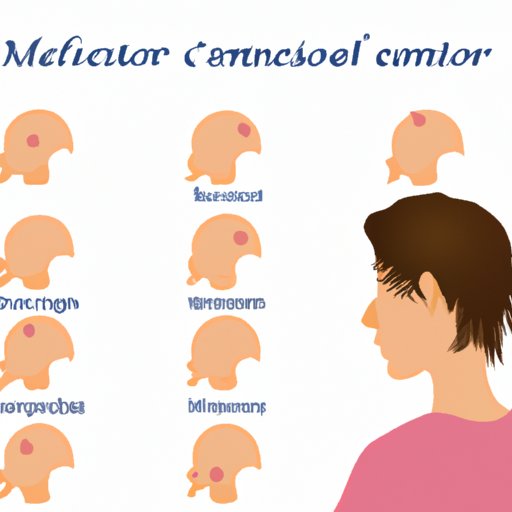Introduction
Chemotherapy is a type of medical treatment used to treat cancer and other illnesses. It works by targeting and destroying rapidly growing cells in the body, including cancer cells. However, this also affects other healthy cells, such as hair follicles, which can lead to hair loss. This article explores the link between chemotherapy and hair loss, discussing the types of hair loss associated with chemotherapy, how to cope with hair loss during treatment, and the emotional impact of hair loss after chemotherapy.

Exploring the Link Between Chemotherapy and Hair Loss
Hair loss is one of the most common side effects of chemotherapy. Chemotherapy drugs target rapidly dividing cells, and hair follicles are some of the fastest growing cells in the body. As a result, chemotherapy drugs can damage or destroy the hair follicles, leading to hair loss. The extent of hair loss varies from person to person, depending on the type of chemotherapy drugs used and individual sensitivity to them.
There are two main types of hair loss associated with chemotherapy: telogen effluvium and anagen effluvium. Telogen effluvium is a temporary condition that causes thinning of the hair. Anagen effluvium is a more severe type of hair loss that can lead to complete baldness. Telogen effluvium usually occurs several weeks after chemotherapy treatments have begun, while anagen effluvium usually occurs within days of starting chemotherapy.
The Reality of Hair Loss After Chemotherapy Treatments
The severity of hair loss after chemotherapy varies from person to person. Some people may experience only mild thinning, while others may lose all of their hair. In general, the more intense the chemotherapy treatment, the more likely it is to cause severe hair loss. Hair loss is usually temporary and will start to regrow once chemotherapy treatments have ended.
In addition to hair loss, chemotherapy can also cause other side effects such as dry skin, itching, and scalp irritation. These side effects can be managed with the use of medications and special shampoos and conditioners. It’s important to talk to your doctor about any side effects you’re experiencing so they can recommend the best course of treatment.
How to Cope With Hair Loss During Chemotherapy
Hair loss during chemotherapy can be difficult to cope with, both physically and emotionally. Here are a few tips for managing hair loss during chemotherapy:
- Consider wearing a wig or scarf to cover your head. Wigs and scarves can help you feel more comfortable and less self-conscious about your appearance.
- Talk to a counselor or support group about your feelings. Talking to someone who understands what you’re going through can provide emotional support and help you cope with the stress of hair loss.
- Take care of your skin. Protect your scalp from the sun with a hat or sunscreen, and use gentle products to keep your skin hydrated and prevent irritation.
If you’re struggling to cope with hair loss during chemotherapy, there are many resources available to help. Your doctor or healthcare team can provide information and advice on how to manage hair loss. You can also find helpful information and support online, such as websites and forums dedicated to helping people cope with hair loss during chemotherapy.

What You Need to Know About Hair Loss After Chemotherapy
Hair regrowth after chemotherapy is possible, but it can take time. Some people may start to see regrowth within a few weeks after treatment has ended, while others may take months or even years before their hair starts to grow back. It’s important to be patient and give your body time to recover after chemotherapy.
If you’re concerned about your hair loss after chemotherapy, it’s important to speak to your doctor. They can assess your situation and provide advice on how to manage your hair loss. In some cases, they may recommend medication or other treatments to help stimulate hair growth.

Understanding the Impact of Chemotherapy on Hair Loss
Hair loss after chemotherapy can be difficult to cope with, both physically and emotionally. It can affect your self-confidence and make it difficult to feel like yourself. It’s important to remember that hair loss is only temporary and that your hair will eventually grow back. It can also be helpful to talk to a counselor or support group about your feelings.
There are also many supportive resources available to help you cope with hair loss after chemotherapy. The American Cancer Society offers a range of resources, such as online support groups, to help people dealing with hair loss after chemotherapy. Your healthcare team can also provide information and advice on how to manage your hair loss.
Conclusion
Hair loss is a common side effect of chemotherapy, and it can be difficult to cope with both physically and emotionally. It’s important to understand the link between chemotherapy and hair loss, as well as the different types of hair loss associated with chemotherapy. There are many resources available to help manage hair loss during chemotherapy, and it’s important to seek medical attention if you’re concerned about your hair loss after chemotherapy. By understanding the impact of chemotherapy on hair loss, you can better prepare yourself and find the support you need to cope with the side effects.


